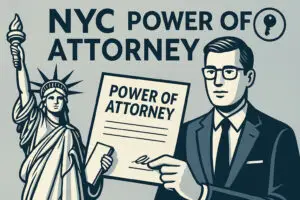Understanding Trusts and Wills in New York: A Comprehensive Guide
Planning for the future can feel overwhelming, especially when it involves complex legal instruments like trusts and wills. In New York State, these documents serve as cornerstones of estate planning, ensuring your assets are distributed according to your wishes and minimizing potential complications for your loved ones. At Morgan Legal Group, we understand the nuances of New York estate law and are dedicated to providing personalized guidance to individuals and families throughout New York City and beyond. This comprehensive guide will explore the key aspects of trusts and wills in New York, offering insights into their purpose, benefits, and the importance of seeking expert legal counsel.
What is a Will?
A will, also known as a last will and testament, is a legal document that outlines how you want your assets distributed after your death. It’s a fundamental component of any estate plan and allows you to designate beneficiaries, appoint an executor to manage your estate, and even name guardians for minor children. Without a valid will, your assets will be distributed according to New York State law, which may not align with your intentions. Preparing a will ensures that your loved ones are taken care of and that your wishes are honored.
A will serves several important functions. First, it allows you to specify who will inherit your property. Second, it allows you to nominate a person or entity to act as the executor of your estate. The executor is responsible for managing your assets, paying your debts, and distributing your property to your beneficiaries. Third, a will can create a trust to manage assets that you leave to minor children or other beneficiaries who may not be capable of managing the funds themselves.
The Importance of Having a Will in New York
In New York, dying without a will, known as dying “intestate,” means the state’s laws will dictate how your assets are distributed. This can lead to unintended consequences and potential disputes among family members. For example, if you have a spouse and children, your assets may be divided between them according to a statutory formula, which might not be the outcome you desired. A well-drafted will avoids these uncertainties and ensures your assets are distributed according to your specific instructions.
Moreover, a will can simplify the probate process, the legal process of validating and administering your estate. A will allows you to nominate an executor of your choosing. This nomination can save your loved ones time, money, and stress. It also enables you to clearly express your wishes regarding funeral arrangements, charitable donations, and other important matters.
Key Components of a Valid Will in New York
For a will to be valid in New York, it must meet certain legal requirements. First, the testator (the person making the will) must be of sound mind and have the legal capacity to make a will, which typically means being at least 18 years old. Second, the will must be in writing and signed by the testator. Third, the will must be witnessed by two individuals who are not beneficiaries under the will. These witnesses must also sign the will in the testator’s presence.
The language used in a will must be clear and unambiguous to avoid any potential misinterpretations or legal challenges. It’s essential to identify beneficiaries by their full legal names and specify the assets they are to receive with sufficient detail. If you have complex assets or family situations, it is advisable to consult with a trusts and wills lawyer NYC to ensure your will is properly drafted and reflects your intentions.
What is a Trust?
A trust is a legal arrangement in which one person (the grantor or settlor) transfers assets to another person (the trustee) to hold and manage for the benefit of a third person (the beneficiary). Trusts can be established during your lifetime (living trusts) or after your death through your will (testamentary trusts). They offer numerous benefits, including asset protection, tax planning, and control over asset distribution. Trusts are incredibly flexible and can be customized to meet a variety of estate planning needs.
Unlike wills, trusts can avoid probate, which can save time and money for your heirs. Furthermore, trusts can be more difficult to challenge in court than wills. Also, trusts provide a level of privacy not available with wills, as trusts do not become public records.
Types of Trusts Commonly Used in New York
New York law recognizes various types of trusts, each designed to achieve specific estate planning goals. Here are some of the most common types:
- Revocable Living Trust: This type of trust allows you to retain control over your assets during your lifetime. You can modify or revoke the trust at any time, and you serve as the trustee. Upon your death, the assets held in the trust are distributed to your beneficiaries according to the terms of the trust agreement, avoiding probate.
- Irrevocable Trust: Unlike a revocable trust, an irrevocable trust cannot be easily modified or terminated once it’s established. These trusts offer significant asset protection and tax benefits. They are often used for estate tax planning and to protect assets from creditors.
- Testamentary Trust: This type of trust is created through your will and comes into effect upon your death. Testamentary trusts are commonly used to manage assets for minor children or beneficiaries with special needs.
- Special Needs Trust: Designed to provide for individuals with disabilities without jeopardizing their eligibility for government benefits, such as Medicaid and Supplemental Security Income (SSI).
- Charitable Trust: Created to benefit a charitable organization or purpose. Charitable trusts can provide tax benefits while supporting causes you care about.
- Supplemental Needs Trust: This type of trust is created to provide for the needs of a person with a disability without affecting their eligibility for public benefits like Medicaid and Supplemental Security Income (SSI).
The choice of which type of trust is right for you will depend on your individual circumstances and estate planning goals. An experienced trusts and wills attorney New York can help you evaluate your options and create a trust that meets your specific needs.
Benefits of Establishing a Trust in New York
Trusts offer several significant advantages over wills, especially for individuals with complex assets, family situations, or specific estate planning objectives. One of the most significant benefits is avoiding probate. Probate can be a lengthy, costly, and public process. Assets held in a trust pass directly to your beneficiaries without going through probate, saving time, money, and maintaining privacy.
Trusts also provide greater control over asset distribution. You can specify when and how your beneficiaries will receive their inheritance. This is particularly useful for managing assets for minor children, individuals with special needs, or beneficiaries who may not be financially responsible. Trusts can also offer asset protection, shielding your assets from creditors, lawsuits, and even potential divorce settlements. Furthermore, certain types of trusts can minimize estate taxes, preserving more of your wealth for your heirs.
Choosing Between a Will and a Trust: Which is Right for You?
Deciding whether to create a will or a trust depends on your individual circumstances and estate planning goals. A will is a fundamental document for anyone who wants to direct the distribution of their assets after death. It’s relatively simple to create and is suitable for individuals with straightforward estates.
However, if you have complex assets, a blended family, or specific concerns about probate, asset protection, or tax planning, a trust may be a better option. Trusts offer greater flexibility and control over asset management and distribution. They can also provide significant benefits for individuals with special needs dependents or those seeking to minimize estate taxes. For many, a comprehensive estate plan will incorporate both a will and one or more trusts, working in conjunction to achieve your long-term goals.
Understanding Revocable Living Trusts in Detail
The revocable living trust is a popular estate planning tool in New York because of its flexibility and control. As the grantor, you retain the right to manage the trust assets during your lifetime. You can also modify or revoke the trust at any time, making it adaptable to changing circumstances. The grantor typically serves as the initial trustee, maintaining control over the assets.
Upon your death or incapacitation, a successor trustee takes over management of the trust assets and distributes them according to the terms of the trust agreement. One of the primary advantages of a revocable living trust is avoiding probate. Assets held in the trust pass directly to your beneficiaries without going through the probate process, saving time, money, and maintaining privacy. The trust also provides a mechanism for managing your assets if you become incapacitated, ensuring your financial affairs are handled according to your wishes.
The Role of Irrevocable Trusts in Estate Planning
Irrevocable trusts, unlike revocable trusts, are designed to be permanent. Once established, they cannot be easily modified or terminated. This permanence offers significant asset protection and tax benefits. By transferring assets into an irrevocable trust, you remove them from your taxable estate, potentially reducing estate taxes. These trusts also protect assets from creditors, lawsuits, and other potential claims.
Irrevocable trusts are often used for specific estate planning purposes, such as life insurance trusts (ILITs), which hold life insurance policies to minimize estate taxes, and grantor-retained annuity trusts (GRATs), which allow you to transfer assets to your beneficiaries while minimizing gift and estate taxes. Setting up an irrevocable trust requires careful planning and legal expertise, as the terms of the trust cannot be easily changed once it’s established. Therefore, it’s vital to consult with an experienced estate planning lawyer in NY.
How a Will and a Trust Work Together
While wills and trusts serve different purposes, they can often work together to create a comprehensive estate plan. A common strategy is to establish a revocable living trust to hold the majority of your assets and then create a “pour-over will.” The pour-over will directs any assets that are not already in the trust at the time of your death to be transferred into the trust. This ensures that all of your assets are ultimately distributed according to the terms of the trust agreement.
The will can also address matters that are not typically covered by a trust, such as naming guardians for minor children and expressing your wishes regarding funeral arrangements. By combining a will and a trust, you can create a comprehensive estate plan that addresses all of your needs and goals, ensuring your assets are protected and distributed according to your wishes. This combination helps ensure all assets, intended or unintended, are distributed according to your overarching estate plan.
Navigating the Probate Process in New York
Probate is the legal process of validating and administering a will. If you die with a will, your executor must file the will with the Surrogate’s Court in the county where you resided. The court will then determine the validity of the will and appoint the executor to administer your estate. The executor is responsible for identifying and valuing your assets, paying your debts and taxes, and distributing your remaining assets to your beneficiaries.
The probate process can be time-consuming and costly, especially for complex estates. It can also be a public process, meaning your will and estate information become part of the public record. Avoiding probate through the use of trusts can save time, money, and maintain privacy. However, if you have a will, it’s important to understand the probate process and work with an experienced attorney to ensure your estate is administered efficiently and effectively.
Common Mistakes to Avoid When Creating a Will or Trust
Creating a will or trust is a complex process, and it’s important to avoid common mistakes that can undermine your estate plan. One of the most common mistakes is failing to update your will or trust when your circumstances change. Life events such as marriage, divorce, birth of a child, or significant changes in your assets can all impact your estate plan. It’s important to review your will and trust regularly and make necessary updates to ensure they reflect your current wishes and circumstances.
Another common mistake is failing to properly fund a trust. A trust only controls assets that are titled in the name of the trust. If you create a trust but fail to transfer your assets into the trust, those assets will still be subject to probate. It’s important to work with your attorney and financial advisor to ensure your trust is properly funded.
Also, ensure that you keep your will and trust documents in a safe, accessible place and that your executor and trustee know where to find them. Finally, seek legal advice to avoid unintentionally disinheriting a spouse or child, or creating other legal issues with unintended beneficiaries.
The Importance of Working with a Trusts and Wills Lawyer in NYC
Creating a will or trust is a significant legal undertaking, and it’s important to work with an experienced trusts and wills lawyer in NYC to ensure your estate plan is properly drafted and reflects your wishes. A qualified attorney can guide you through the process, explain your options, and help you make informed decisions. They can also ensure your documents comply with New York law and minimize the risk of legal challenges.
A trusts and wills lawyer can also provide valuable advice on tax planning, asset protection, and other important considerations. Working with an attorney can give you peace of mind knowing your estate plan is in good hands and that your loved ones will be taken care of according to your wishes. Russell Morgan Esq. and the team at Morgan Legal Group are dedicated to providing personalized and effective estate planning services to individuals and families in New York City and beyond.
How to Choose the Right Trusts and Wills Attorney
Selecting the right attorney to assist with your estate planning needs is crucial for ensuring a smooth and satisfactory experience. Start by seeking recommendations from friends, family, or other trusted advisors. Look for attorneys who specialize in trusts and wills and have a proven track record of success. It’s essential to find an attorney who is knowledgeable, experienced, and responsive to your needs.
Schedule consultations with several attorneys to discuss your specific circumstances and goals. Ask about their experience, fees, and approach to estate planning. Pay attention to how well they communicate and whether you feel comfortable working with them. The attorney-client relationship is built on trust and open communication, so it’s important to choose someone you feel confident in.
Consider reading online reviews and checking the attorney’s disciplinary record with the New York State Bar Association. A good attorney will be transparent about their qualifications and experience. Also, make sure to clarify payment and billing practices upfront.
Updating Your Will and Trust: When and Why
Your will and trust should not be considered static documents. They need to be reviewed and updated periodically to reflect changes in your life, family, and assets. Major life events such as marriage, divorce, birth of a child, death of a beneficiary, or significant changes in your financial situation should trigger a review of your estate plan.
Changes in the law can also impact your estate plan. Tax laws, for example, are constantly evolving, and it’s important to ensure your estate plan is structured to minimize taxes and maximize benefits for your heirs. It’s generally recommended to review your will and trust at least every three to five years, even if there have been no major life changes. Consulting with your attorney regularly can help you stay on top of these changes and ensure your estate plan remains effective.
Asset Protection Strategies in New York
Asset protection is an important consideration in estate planning, particularly for individuals in high-risk professions or those with significant wealth. Trusts can be powerful tools for protecting your assets from creditors, lawsuits, and other potential claims. Irrevocable trusts, in particular, offer significant asset protection benefits. By transferring assets into an irrevocable trust, you remove them from your personal estate, making them less vulnerable to creditors.
Other asset protection strategies include using limited liability companies (LLCs) to hold business assets, purchasing liability insurance, and making strategic use of retirement accounts. It’s important to work with an experienced attorney to develop an asset protection plan that is tailored to your specific needs and circumstances. An attorney will understand New York’s laws regarding asset protection and work with you to create the optimal strategy.
Understanding Estate Taxes in New York
Estate taxes can significantly impact the amount of wealth your heirs ultimately receive. New York has its own estate tax, in addition to the federal estate tax. The New York estate tax applies to estates exceeding a certain threshold, which is adjusted annually. As of 2024, the New York estate tax threshold is \$6.94 million.
There are several strategies you can use to minimize estate taxes, such as making lifetime gifts, establishing irrevocable trusts, and utilizing qualified retirement plans. An experienced estate planning attorney can help you navigate the complexities of estate tax laws and develop a plan that minimizes your tax liability. Careful planning can help preserve more of your wealth for your loved ones.
Planning for Incapacity: Power of Attorney and Health Care Proxy
Estate planning is not just about what happens after you die. It’s also about planning for the possibility of incapacity. If you become unable to manage your financial affairs or make healthcare decisions, it’s important to have legal documents in place that authorize someone else to act on your behalf. A power of attorney allows you to appoint someone to manage your financial affairs, while a health care proxy allows you to appoint someone to make healthcare decisions for you.
These documents are essential components of a comprehensive estate plan. Without them, your family may need to go to court to obtain guardianship, which can be a lengthy and costly process. By executing a power of attorney and health care proxy, you can ensure your wishes are respected and your affairs are managed according to your instructions.
Guardianship for Minor Children
If you have minor children, one of the most important decisions you will make in your will is naming a guardian. The guardian will be responsible for the care and upbringing of your children if you die before they reach adulthood. It’s important to choose someone you trust and who shares your values. You should also discuss your decision with the potential guardian to ensure they are willing and able to take on this responsibility.
In your will, you can also name a conservator to manage any assets you leave to your children. The guardian and conservator can be the same person or different people. It’s important to carefully consider who you want to entrust with the care and financial well-being of your children.
Elder Law Considerations in Estate Planning
Estate planning for seniors often involves unique considerations, such as long-term care planning, Medicaid eligibility, and protecting assets from the costs of nursing home care. Elder law is a specialized area of law that focuses on the legal needs of seniors and their families.
An elder law attorney can help you develop a plan to protect your assets, qualify for Medicaid benefits, and ensure you receive the care you need. They can also assist with issues such as guardianship, elder abuse, and long-term care insurance. If you are a senior or have elderly loved ones, it’s important to consult with an elder law attorney to discuss your options.
The Importance of Regular Estate Plan Reviews
As mentioned previously, your estate plan should be reviewed and updated periodically to reflect changes in your life, family, and assets. It’s a good idea to schedule a regular review with your attorney at least every three to five years, or more frequently if there have been significant changes in your circumstances. During the review, your attorney can assess whether your current plan still meets your needs and make any necessary adjustments.
Regular reviews can help you stay on top of changes in the law and ensure your estate plan remains effective. They can also provide an opportunity to discuss any concerns or questions you may have and make sure your wishes are properly documented.
Working with Morgan Legal Group: Your Trusted Estate Planning Partner
At Morgan Legal Group, we understand the importance of estate planning and are committed to providing personalized and effective legal services to individuals and families in New York City and beyond. Our experienced attorneys can guide you through the process of creating a will or trust, and we are here to help you with any other estate planning needs.
We take the time to understand your unique circumstances and goals, and we develop estate plans that are tailored to your specific needs. We also provide ongoing support and guidance to ensure your estate plan remains effective over time. Contact us today to schedule a consultation and learn how we can help you protect your assets and provide for your loved ones.
The Future of Estate Planning: Digital Assets and Cryptocurrency
As technology evolves, estate planning must also adapt to address new types of assets, such as digital assets and cryptocurrency. Digital assets include online accounts, social media profiles, email accounts, and digital photos and videos. Cryptocurrency, such as Bitcoin and Ethereum, is another increasingly common asset that needs to be addressed in estate plans.
It’s important to include provisions in your will or trust that address how you want your digital assets and cryptocurrency to be managed and distributed after your death. You should also provide your executor or trustee with the necessary information to access these assets, such as usernames, passwords, and private keys. Failing to plan for digital assets and cryptocurrency can create significant challenges for your heirs. Morgan Legal Group stays at the forefront of these developments and offers guidance on incorporating digital assets into your estate plan. Consider also planning for your online accounts and how loved ones can access them after you pass, such as through services like Google’s Inactive Account Manager.
The Emotional Aspects of Estate Planning
While estate planning involves complex legal and financial considerations, it’s also important to acknowledge the emotional aspects. Thinking about death and planning for the future can be difficult and uncomfortable. It’s important to approach estate planning with an open mind and be honest with yourself and your loved ones about your wishes.
It’s also important to communicate with your family about your estate plan. Talking to your loved ones about your wishes can help avoid misunderstandings and potential conflicts in the future. While these conversations can be challenging, they can also be a valuable opportunity to strengthen family relationships and ensure your loved ones are prepared for the future.
Finding Peace of Mind Through Estate Planning
Estate planning can seem overwhelming, but it’s one of the most important things you can do to protect your assets and provide for your loved ones. By taking the time to create a will or trust, you can gain peace of mind knowing your affairs are in order and your wishes will be honored. You can also alleviate stress and uncertainty for your family, making a difficult time a little easier. The feeling of control and preparedness that comes with a solid estate plan is invaluable.
At Morgan Legal Group, we are here to help you navigate the complexities of estate planning and create a plan that meets your specific needs. We are committed to providing compassionate and effective legal services, and we are dedicated to helping you achieve your estate planning goals. Schedule a consultation today to learn more about how we can help you protect your assets and provide for your loved ones. Don’t delay – start planning for your future today!
Morgan Legal Group proudly serves the New York City community including the Bronx, Brooklyn, NYC, Queens, and Staten Island. If you are outside of New York City we also serve Long Island including Suffolk County. As well as Westchester, Ulster County, and Orange County.NY Courts









